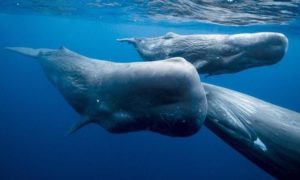Événement Ciné
Wednesdays for the Planet | The Song of the Sperm Whale
Wednesdays for the Planet is a series of online screenings and virtual presentations with experts highlighting the natural world and other environmental challenges our planet faces. The virtual screenings are for educational purposes, non-profit and non-commercial.
Documentary
The Song of the Sperm Whale (Le clan des cachalots)
Long massacred by whaling ships, sperm whales have almost disappeared. Saved by the cessation of hunting in the 80s and conservation efforts, the largest predators on the planet have to this day always been studied from the surface, leaving the mystery hanging over their underwater life.
A film by Stéphane Granzotto and François Sarano, the documentary follows for the first time a team of scientific divers immersing themselves in the daily life of a clan of cetaceans. Off the coast of Mauritius, and for seven years, they shared the fascinating life of the clan, and tried to unravel the mysteries of their communication through a specially designed recorder.
Witnesses of intimate moments of life never observed before, from the exchanges between a mother and her newborn to the relationship between the latter and her “nanny”, they tried to decipher the secrets of their dialect, but also the complex relationships woven within this astonishing matriarchal and solidary society.
Online Screening
Watch the trailer (in English) below. The full documentary (in French) is available on RTS Suisse until 15 October 2021.
Expert

Chris Johnson
Global Lead, WWF Protecting Whales and Dolphins Initiative
Chris Johnson is a marine scientist and conservation strategist. He leads the WWF Protecting Whales and Dolphins Initiative based at WWF Australia in Melbourne.
Chris has studied whales, their habitats and human impacts, such as ocean pollution, climate change, entanglements and ship-strikes in 25 countries and on the high seas. At WWF, he most recently led the Antarctic program coordinating global efforts with NGOs, Governments, industry, and Universities to bring science to policy outcomes such as establishing marine protected areas at the Commission for the Conservation of Antarctic Marine Living Resources (CCAMLR) and through the Antarctic Treaty. A key highlight was working with partners helped to secure the largest marine reserve on Earth in the Ross Sea in 2016. He helped establish new science partnerships with University of California, Santa Cruz and Duke University using new technologies to study and monitor Antarctic whales including deploying the first camera tag on an Antarctic minke whale.
Science communication is a passion for Chris. He led WWF’s global science communication based in Switzerland and climate change communications for CSIRO – Australia’s national science agency. He is an accomplished wildlife photographer and documentary filmmaker having produced work for National Geographic Magazine and Television, BBC, Univision, PBS Television and with NGO and government organizations including the US Marine Mammal Commission, NOAA and the Ocean Foundation.
Chris holds an MSc in Environmental Science from Murdoch University (Australia) and has co-authored numerous science publications and reports on cetacean ecology, habitat modelling and acoustics. He is currently undertaking a PhD part-time at Curtin University (Australia) Centre for Marine Science and Technology studying sperm whale bioacoustics and distribution.
Virtual Presentation
Links
- How Whales Help Cool the Earth | BBC Future Planet | 20 January 2021
- Shipping and Cetaceans | WWF | 2021
- What’s in the Net? Using camera technology to monitor, and support, mitigation of, wildlife bycatch in fisheries | WWF | 2020
- Guidelines for the Safe and Humane Handling and Release of Bycaught Small Cetaceans from Fishing Gear | WWF | 2020
- Sperm Whale Wild for Life Campaign | United Nations Environment Programme and Convention on International Trade in Endangered Species of Wild Fauna and Flora (CITES)
- Sperm Whale Appendix I | CITES

